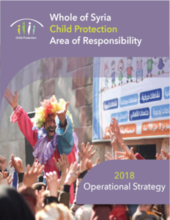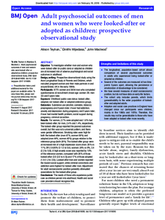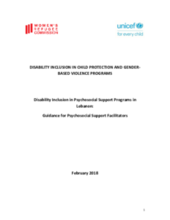Displaying 241 - 250 of 513
This report from the Child Protection Area of Responsibility (CP AoR) highlights the child protection needs and responses in Syria and includes objectives and targets for continued child protection interventions and strategies.
The objective of this study was to investigate whether men and women who were looked-after (in public care) or adopted as children are at increased risk of adverse psychological and social outcomes in adulthood.
This study aimed to assess both the prevalence of stress and the coping mechanisms as well as identify the predictors of stress levels among adolescents in Malaysian orphanages.
The aim of this paper is to describe findings from a survey which identified barriers and facilitators to collaboration between child welfare and adult mental health service providers.
The aim of the current study was to examine whether contact with CPS is associated with improved mental health outcomes among adult respondents who reported experiencing child abuse, after adjusting for sociodemographic factors and abuse severity.
This resource is designed to support PSS Facilitators to strengthen inclusion of children and adolescents with disabilities in a range of PSS activities, including community based and focused activities.
The goals of the present study are to examine the association between childhood adversity and adult functioning among youth aging out-of-care, and to explore how attributes of their social support networks mediate this association.
The aim of this study was to investigate 60 foster parents' acceptance, commitment and awareness of influence to their early placed foster children at 2 years, as well as to investigate the association between these three concepts and the foster children's social-emotional functioning (externalizing, internalizing, dysregulation and competence) at 2 and 3 years of age.
This study explored whether trust in caregiver support and communication about experiences with primary caregivers, are associated with Child Welfare System (CWS) youngsters’ depressive symptoms and/or self-harm.
This article explores whether the number of visits by birth parents influence perceptions of attachment, children’s competence and mental health, and stress levels in foster parents.




